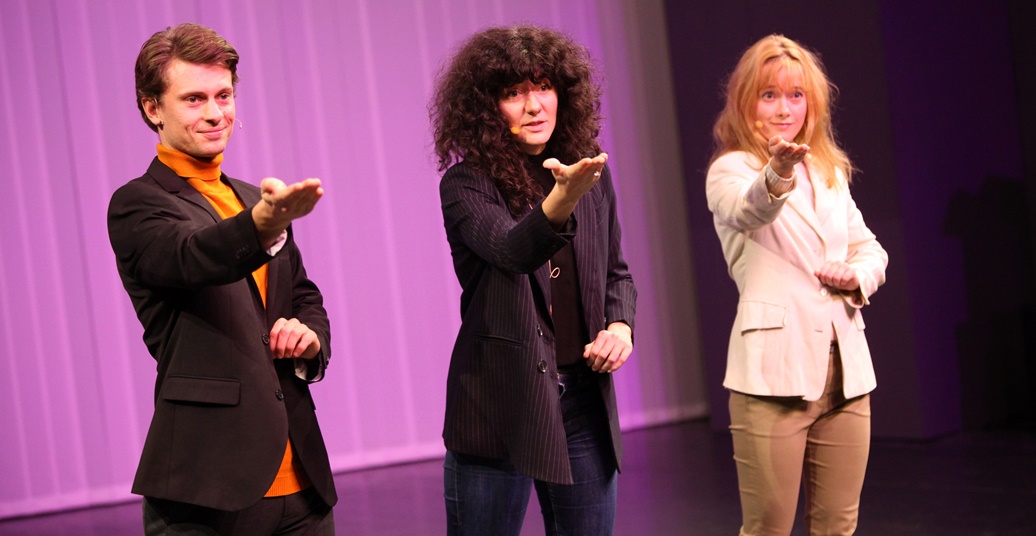In “Happyology – Tears of Joy” Dragana Bulut provides the audience with (unsolicited) training in self-optimization poses
Before I begin writing this text, a brief warm-up exercise: hands on your hips, knees slightly bent, pelvis tilted forward to lengthen the lower back, chin raised, neck long, eyes focused intently forward and… laugh. Adopt the ‘Wonder Women’ pose more often. On to the text.
Self-optimization has become a new lifestyle. The choreographer Dragana Bulut attempts to uncover the ideology behind the be happier imperative with the help of performers Kareth Schaffer and Andrew Hardwidge. In this process, she draws on the rhetoric and lack of emotional detachment from current thriving life consultations and coaching methods in order to demonstrate them and test their effects – the request to don a name tag does not bode well – it is surprising how easily manipulation works: standing ovations upon command in the first five minutes. Bulut et al swear us in as a community, appeal to our sympathies, and rely on peer pressure. My tension and indecision follow me throughout the entire performance, I sink deeper and deeper into my chair and hope I won’t be directly addressed or quoted on stage. At the same time, I feel bad about refusing to to participate in the guided exercises. I don’t want the performers to be met with rejection, to block the process. It is soon clear: more than anything, “Happyology” is a tutorial on consent. The piece bluntly flaunts its own strategy and reveals the perfidious logic, the subtle pressures masked by the promise of happiness. The seemingly harmless, trustworthy ideology nestles up to us, speaks to our vanity and our fears of failure with catchy, enduring platitudes. Andrew Hardwidge and Kareth Schaeffer have placed their palms together. They exude calm, confidence, and persuasion and they approach individual audience members: “On a scale of one to ten: how do you feel today?”, “What is working in your life, what areas are causing you difficulties and why?”
While the two convincingly push forward with their agenda, striking a balance between intimidation and seduction, I cling to the piece of dark chocolate hidden under our seats as a gift (good for balancing endorphins, in general it is good to receive gifts and be thankful for them), and even in that terrifying moment when someone looks in my direction, I can enjoy myself and even let myself be enticed into participating. This spectacle, which plays with long-known but no less effective tricks of persuasion and entertainment, leaves me so happy, so confused. We are guided from one program point to the next in an easily digestible manner: speaking choir, small participation exercises, still more question and answer games.
After some audience members appear to have candidly revealed their personal strengths and weaknesses, others willingly assemble to demonstrate falling, getting up, moving on. Even once Dragana Bulut has made her full, also visual, transition into an optimization zombie – with glowing eyes, green teeth, a torn open throat, she staggers obliviously across the stage with distorted guffaws, and spurs Kareth Schaeffer to action with the lash of a whip, we nevertheless permit ourselves to enjoy the green smoothies served to us at the end of the show by voluntary-involuntary helpers. It is this “nevertheless” that lingers in the space as food for thought and what “Happyology” reminds us of: the seduction beneath the promise that everything can be a tiny bit better.
English translation by Melissa Maldonado




